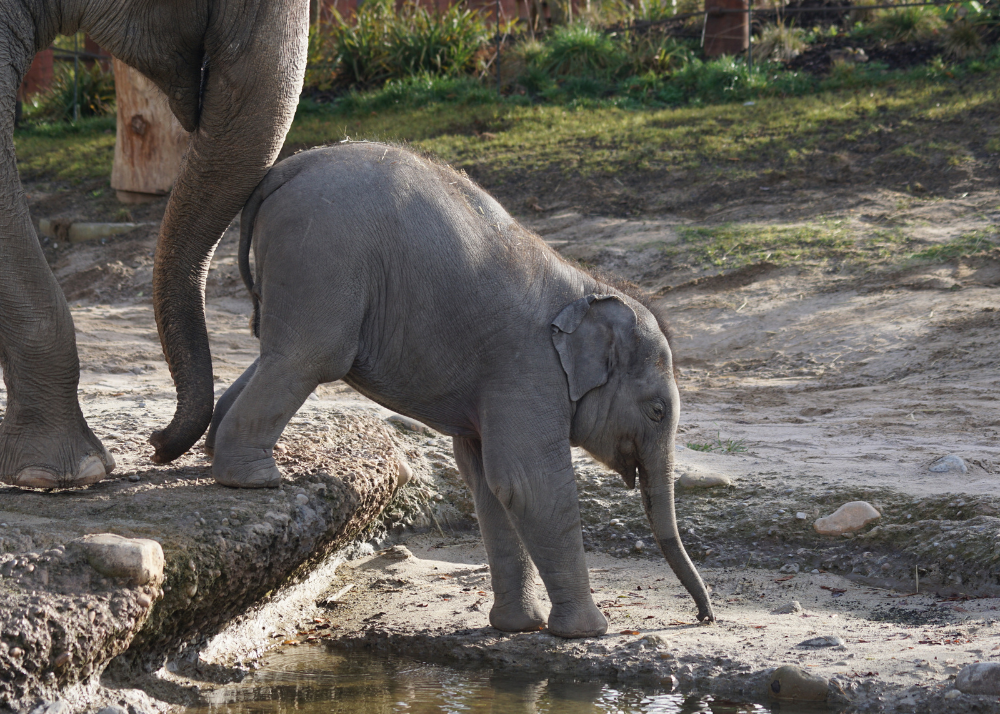Can Elephants Breed in Captivity?
Breeding elephants in captivity presents considerable challenges due to their intricate social and emotional needs, which often complicate the process far more than other species. While it is possible for elephants to breed and give birth to calves in captive environments, the human intervention required can lead to considerable stress for the elephant(s) involved. Despite instances of successful breeding, the topic carries a fair bit of controversy online.
When searching "Can elephants breed in captivity," you will likely see contradicting answers from the top few online results. The variation of information all comes down to who is publishing the information and their ideology about captive breeding. Today, the top Google result for that search term states that it is easy to breed elephants in captivity and that breeding success has been on the rise in recent years. The second result says that many captive elephants have poor fertility and cannot conceive.
When considering the sources of these results, you can guess which one of those answers came from a zoo and which from an animal rights organization. The organization's ethical stance on captive breeding influences these answers, and while this article examines the ethics, we also break down the facts behind the captive breeding of elephants.
How do Elephants Breed in Captivity?
There are three ways in which elephants can be bred in captive environments. These methods differ by region, facility type, and available resources. However, arguably the most significant distinction between these three methods is the ethics behind the practice. The three ways elephants can be bred in captivity are through artificial insemination, forced breeding, or housing breeding pairs together and hoping they naturally reproduce.
Artificial Insemination of Elephants
Zoos typically employ artificial insemination programs for breeding. Their goal is to maintain healthy captive populations of the species they house; to support this objective, they actively use genetic material from male elephants to inseminate female elephants nationwide.
Captive breeding programs at zoos train female elephants to stand still during insemination, eliminating the need for heavy sedation or medication. Often, these programs tie all four of the elephant's feet to prevent movement that might compromise the procedure or staff safety.
Ethical Implications: risk of causing trauma from unwanted, forced pregnancy and other psychological risks that can lead to abnormal maternal behaviors like infanticide* or disinterest in the eventual calf. Rejection of a calf could lead to the calf dying young from not receiving the necessary nutrients and care.
*Infanticide occurs when a female elephant kills her calf. Captive females in confined, suboptimal environments may perform infanticide, possibly because the mother rejects the prospect of her baby living under such conditions. Researchers have drawn this conclusion because wild elephant populations do not exhibit infanticide.
Forced Breeding Practices
Forced breeding is generally practiced in Asian countries and differs from artificial insemination in that the male elephant is brought to the female and forced to mount and breed with her. This method requires restraining the female so she cannot evade mounting attempts. Due to ethical concerns, sanctuaries and facilities that prioritize animal welfare never implement forced breeding practices.
Ethical Implications: risk of trauma because of the female's lack of autonomy over her body during breeding. In addition to the psychological impacts this leaves on the female, it can be very dangerous. Bulls that show no interest in breeding often attack females, resulting in death or severe injuries that lead to lifelong disabilities.
Natural Breeding in Elephants
In some sanctuaries and free-range projects, elephants have more opportunities to socialize and regain their autonomy, which allows them to breed naturally. However, this is less common in captive environments across Asia, as many facilities that promote autonomy for their herds often discourage captive breeding whenever possible. To avoid breeding, some facilities prefer to keep their bulls separate from females or will chemically castrate males.
Many facilities discourage breeding because we do not need more elephants in captivity; instead, we should focus on increasing the population of elephants in the wild and rescuing those living in exploitative environments. If captive facilities were to continue breeding elephants, we would continue to have captive-born elephants that are not well-adjusted and not contributing to the wild populations.
Success Rate of Captive Breeding with Elephants
The success rate of captive breeding programs differs by facility type. A critical component is the captive elephant lifespan, effectively reducing breeding opportunities. Researchers at the People for the Ethical Treatment of Animals (PETA) have found that the average lifespan for an elephant in the United States in captivity is around 27 years old. This would give an elephant the chance to potentially have one calf, whereas, in the wild, elephants have several calves in their lifetime of 60-70 years.
Numerous health issues significantly reduce lifespan, with high rates of developing reproductive problems, such as ovarian cysts, compared to wild counterparts. In addition, with diets inconsistent with their natural wild diet, many elephants in captivity are either overweight or underweight, which can affect fertility and the ability to carry a pregnancy to term. According to research published by the Born Free Foundation, 40% of zoo elephant calves die before age five.
Additional data provided by the Born Free Foundation found that, in North America, since 1995, 17 African elephants have been born and 38 Asian elephants born. Of these calves born, only six African and 24 Asian elephants survived. This data shows that while yes elephants can breed in captivity and their rate of obtaining viable pregnancies may increase, the survival rate is not overly impressive.
Is it Ethical to Breed Elephants in Captivity?
Many conservationists and animal welfare advocates maintain that captive breeding is unethical and irresponsible. On the other hand, zoos and other captive environments that profit from allowing tourists to interact with and see elephants argue that it is our responsibility to breed these endangered animals.
While both sides may never see eye to eye, and you might agree with one side more than the other, here is an animal welfare-centric perspective on why captive breeding is unethical and should not occur in any facility that does not actively release elephants back into the wild:
Captive-born elephants do not contribute to wild population conservation because captive-born elephants are rarely, if ever, released into the wild. This situation is common in zoos and many captive facilities in Asia that claim their breeding programs are for conservation purposes. Since the calves born in these facilities will not be released into the wild and cannot contribute to wild populations, they are not counted when assessing whether the species is classified as endangered. This raises an important question: do these breeding programs truly hold conservation value? If they do not, can they genuinely be considered conservation programs? For instance, if elephants were to go extinct in the wild, but a population still existed in zoos in the United States, how would that help save the natural ecosystems in Asia and Africa, which would collapse without the presence of this species? Breeding elephants to live in suboptimal conditions in non-range countries primarily benefits the businesses that profit from these animals to the detriment of the animals themselves.
Elephants are sentient beings with similar brain structures to humans and, because of this, are at high risk of the same psychological disorders humans suffer from. It is unethical to force elephants to become pregnant, whether through invasive insemination practices or being mounted by a bull against their will, knowing the psychological distress it causes.
To return to the original question— yes, elephants can breed in captivity; however, when considering the ethical implications of breeding, it's important to remember that elephants are incredibly intelligent, sentient beings who can suffer from trauma just as we can. While the psychological impacts may be justifiable if they were to support a dying wild population, captive efforts to breed elephants are primarily to keep elephants in captivity.



